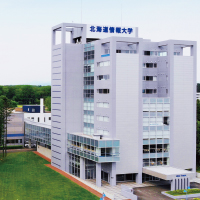- 北海道情報大学TOP
- TOPICS
- The Hokkaido Information University FD (Faculty Development) Expert Forum 2013 was held.
TOPICS
- 2013.10.03
- #イベント
- #お知らせ
- #トピックス
The Hokkaido Information University FD (Faculty Development) Expert Forum 2013 was held.
On September 17th, 2013 the Hokkaido Information University FD (Faculty Development) Expert Forum 2013 was held. The invited speaker was Dr. Patricia Coward, Director of the Center for Teaching excellence at Canisius University, located in Buffalo, New York. The one-day forum was split into two parts; the morning session consisting of two short lectures and the afternoon session, a workshop presented in an active learning format.
 Many educators attended both the lectures and the workshop, both of which discussed and presented contemporary themes and issues in higher education. Simultaneous translation was carried out by Ms. Satsuki Tani, an extremely talented bilingual lecturer working as a part-time lecturer at the university.
Many educators attended both the lectures and the workshop, both of which discussed and presented contemporary themes and issues in higher education. Simultaneous translation was carried out by Ms. Satsuki Tani, an extremely talented bilingual lecturer working as a part-time lecturer at the university.
The first lecture on the morning of the 17th was titled, “Is this the Future of Online Higher Education?: MOOCs” which discussed the relevance and appropriateness of the recent MOOCs movement in higher education. The number of students who take the course are often in the thousands or more (Massive), the course is typically free and accessible to anyone (Open), it is also typically conducted over the Internet (online), and is presented as a series of lectures (Course). The first letters of each of these words form the acronym MOOC. Dr. Coward discussed issues concerning cost, quality assurance, credit acquisition and transfer, and likely changes in the future. The lecture was also very timely as the national broadcaster, NHK, also broadcasted a documentary on the same theme a few days after the lecture.
 In the second morning lecture, Dr. Coward discussed the importance of “learning-space” design. Some 57 people (including 47 educators) attended the lecture. Dr. Coward stressed four major findings witnessed in better classroom design; namely, that problem solving ability has been shown to improve, conceptual understanding is increased, attitudes are improved, and failure rates (especially for women and minorities) are drastically reduced.
In the second morning lecture, Dr. Coward discussed the importance of “learning-space” design. Some 57 people (including 47 educators) attended the lecture. Dr. Coward stressed four major findings witnessed in better classroom design; namely, that problem solving ability has been shown to improve, conceptual understanding is increased, attitudes are improved, and failure rates (especially for women and minorities) are drastically reduced.
In the afternoon, Dr. Coward conducted a workshop centering on the concept of “flipping the classroom”. In the flipped classroom, the more didactic components of the class are moved online, using recorded video presentations and Web-based activities, leaving face-to-face time free for collaborative problem-solving and instructor tutorials. As a demonstration, using an active learning approach, Dr. Coward held a mock lesson on Art History, breaking the audience into groups of 3 or 4, with each team leader presenting group findings to the whole class. The experience was very dynamic and enjoyable, with many educators understanding that there are more ways to engage learners than just regular “chalk and talk” lectures.
 The forum was both successful and enjoyable, causing many educators to rethink their current approaches and contemplate the dynamic, changing nature of higher education. Many educators actively questioned Dr. Coward in English, and the overall atmosphere of the forum was one of optimism and willingness to accept the new challenges that the changing face of education brings. The forum offered concrete advice of how to further improve Faculty Development at Hokkaido Information University.
The forum was both successful and enjoyable, causing many educators to rethink their current approaches and contemplate the dynamic, changing nature of higher education. Many educators actively questioned Dr. Coward in English, and the overall atmosphere of the forum was one of optimism and willingness to accept the new challenges that the changing face of education brings. The forum offered concrete advice of how to further improve Faculty Development at Hokkaido Information University.
MONTHLY
2024
2023
2022
2021
2020
2019
2018
2017
2016
2015
2014
2010
2007
2005







